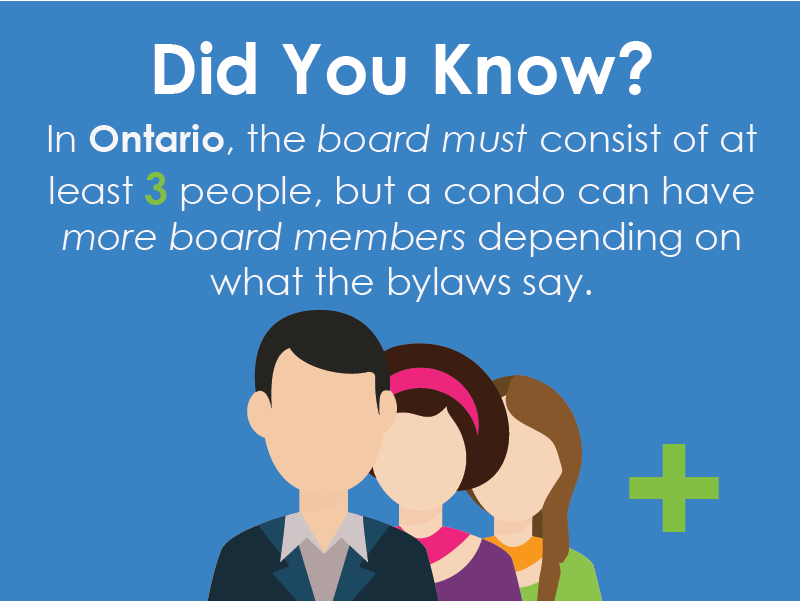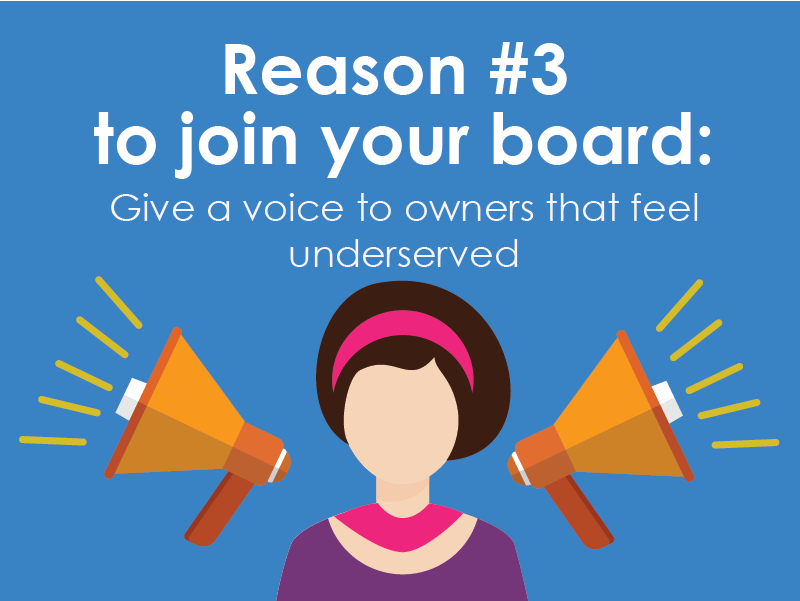What comes to mind when you think of your current condo board? Many owners may have a hard time coming up with anything simply because they aren’t interested in or aware of what the board does.
Even though condo boards only need a handful of members to serve, corporations struggle to find interested candidates. Owners may think that this role will be too much of a commitment, or too difficult, and to be honest, it is a big responsibility. But that shouldn’t stop you from getting involved.
Condo board basics
When election time comes around, the existing board will typically inform owners of the number of board positions available, and send out a call for interested candidates. Candidates who are qualified to serve should inform the board, in writing, of their intention to run. They should give the board their name, address, and any other information that has been requested, before the notice of the AGM is sent to owners.
Condo board members are elected by owners (and anyone else eligible to vote) during the annual general meeting (AGM). The board of directors oversees the business affairs of the condo corporation.
The board meets regularly to discuss and make decisions about repairs, finances, bylaws and rules, building issues and future projects. Meetings generally occur once a month, though they can take place more or less frequently.
Some of the board’s core duties include:
- Tracking and managing the condominium’s financial health
- Communicating with and helping owners
- Enforcing rules to promote the safety, security, and welfare of owners. Rules and bylaws may also be amended provided changes are supported by the majority of unit owners
- Ensuring required maintenance and repairs are carried out
- Hiring specialists, vendors, contractors, etc.
The board of directors must ensure the corporation is in compliance with the Ontario Condominium Act. Condo bylaws and rules must not contradict anything in the Act.
Board requirements
In Ontario, the board must have at least 3 directors. It can have more members (5 to 7 is common), depending on what the condo declaration says.

An odd number of directors is best as it helps prevent stalemates during board votes. Terms can last up to 3 years, and are typically set so that they don’t all expire at the same time. Having this sort of setup in place helps ensure that there is always an experienced director on the board.
Are you qualified to serve?
There are some requirements you should be aware of if you’re considering running for a spot on the board. To be a director in Ontario, you must:
- Be at least 18 years old
- Not be bankrupt
- Not have been found incapable of managing property within the meaning of the Substitute Decisions Act or the Mental Health Act
- Be an individual (not a business)
- Not have been found to be incapable by any court in Canada or elsewhere
- Have complied with the required disclosure obligations
Your condo corporation’s bylaws may impose additional qualifications for candidates seeking election. For example, most condo bylaws will require that a director be an owner of a unit in the building.
You should also note that effective November 1, 2017, directors elected or appointed on or after that date are required to take online training offered by the Condominium Authority of Ontario. It is not an extensive program though; it only takes a few hours to complete.
In addition to these requirements, board members excel if:
- They are willing to learn
- They are proactive when it comes to budgets, repairs, upgrades, meetings and events
- They are strong communicators and active listeners
- They are consistent and fair
- They are prepared to take actions that serve the best interests of the community
5 reasons to join your condo board
Now that you have a clearer idea of what board members do, you can explore some of the main reasons why owners become board members.
1. Preserve the integrity of the condo building
If you plan to stay in your condo unit for at least a few years, you’ll want to make sure the property value doesn’t drop so that you can sell at a higher price when it is time to move. It’s also more enjoyable to live in a building that operates well. When you join the board, it’s easier to enforce or modify community rules and maintenance initiatives, which can ultimately affect the value of your property.
2. Improve the corporation’s financial health
As a board member, you have direct access to all of the numbers. You can assess the adequacy of the reserve funds, look at budget vs. actual spend, and introduce suggestions that could help reduce costs for the entire community. By serving on the board, you get an inside look at where money is coming from, and where it goes, and can develop a greater understanding of the financial state of your community and the realities of running a condo corporation.
3. Give a voice to owners who feel underserved
Condo buildings house all types of people who have many different interests and concerns. For example, young families and retired owners might have very different opinions on how decisions should be made.

You might be interested in joining your condo board because you are a member of a group that isn’t getting the attention it seeks. While you cannot change all of the rules or cater exclusively to one group, you can help underserved populations by vocalizing some of their issues or ideas.
4. Change the rules
If you want to create real change in your condo, the best way to do it is to become a board member. Board members cannot change the rules without approval from a majority of owners, but it’s far easier to introduce new rules or make amendments if you are the one responsible for overseeing this process.
5. Build a deeper connection with your condo community
While serving on the condo board, you will inevitably meet new people who you’ve never seen before. You get the opportunity to socialize, hear some great ideas and gain a better understanding of your community’s preferences, concerns and requirements. Neighbours aren’t the only new people you’ll work with. You’ll also get to meet and network with vendors, lawyers, property managers, accountants, engineers, etc., which gives you a chance to foster genuine relationships with your community partners.
Conclusion
While each board experience is different, joining your condo board will be a worthwhile endeavour. You will learn new things about finances, maintenance, and human connections. You’ll get to see all of the small moving parts that keep a condo corporation in good working order, and you’ll get the opportunity to make a difference for your community.
Prior to joining your board, you will need to understand and be at peace with the realities of being a board member. It is a volunteer position, and can be very demanding at times.
Nevertheless, you can serve for just a term if you want to experience what being on the board is like. As long as you act with fairness, consistency, and objectivity, and work with your fellow members, you will do just fine.


